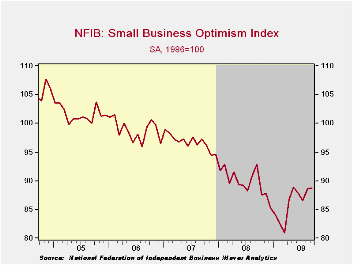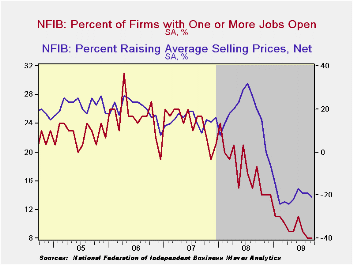 Global| Oct 13 2009
Global| Oct 13 2009U.S. Small Business Optimism Improves Slightly Again
by:Tom Moeller
|in:Economy in Brief
Summary
During September, small business' optimism inched higher for the second month as the severe economic weakness of early this year passed. The National Federation of Independent Business (NFIB) indicated their small business optimism [...]

During September, small business' optimism inched higher for the second month as the severe economic weakness of early this year passed. The National Federation of Independent Business (NFIB) indicated their small business optimism index rose to 88.8 during September after an August uptick. The index remained improved from the lows of this past winter but were down from last year.During the last ten years, there has been an 85% correlation between the level of the NFIB index and the two-quarter change in real GDP.
The percentage of small businesses expecting the economy to improve slipped back to just 8. However, despite this negativism the percentage which thought that now was a good time to expand the business rose sharply to 9 which was the highest level in twelve months. Moreover, the percent reporting higher net-earnings this quarter versus last year held at -40 m/m, meaning fewer were reporting negative earnings versus last year. It was the highest level since December.
The recent improvement in business' sentiment has done little, if anything, to improve hiring intentions. The percentage of firms planning to raise employment fell back into the net-layoff region. Moreover, the percentage of firms with one or more job openings held at just 8% during September, the lowest level since 1982. During the last ten years there has been a 74% correlation between the NFIB employment percentage and the six-month change in nonfarm payrolls. Also to the downside, the percentage expecting credit conditions to ease slipped to the lowest level since May.
On the pricing front conditions eased. The percentage of firms actually raising prices slipped to -21 (indicating deflation) and remained near the record low. During the last ten years there has been a 69% correlation between the six-month change in the producer price index and the level of the NFIB price index.The percentage of firms planning to raise prices also slipped a net 6 though that remained up from the March low of zero. Worker compensation improved modestly.
The largest, single most important problems seen by business were poor sales (32%), taxes (24%, its highest level since 2007), government requirements (11%), insurance cost & availability (8%), competition from large businesses (6%) and inflation (4%).
About 24 million small businesses exist in the United States. Small business creates 80% of all new jobs in America and the NFIB figures can be found in Haver's SURVEYS database.
| Nat'l Federation of Independent Business | September | August | Y/Y | 2008 | 2007 | 2006 |
|---|---|---|---|---|---|---|
| Small Business Optimism Index (SA, 1986=100) | 88.8 | 86.6 | -4.4% | 89.8 | 96.7 | 98.9 |
| Percent of Firms With One or More Job Openings | 8 | 8 | 18 | 18 | 24 | 25 |
| Percent of Firms Raising Avg. Selling Pric1es (Net) | -21 | -19 | 20 | 17 | 15 | 20 |
Tom Moeller
AuthorMore in Author Profile »Prior to joining Haver Analytics in 2000, Mr. Moeller worked as the Economist at Chancellor Capital Management from 1985 to 1999. There, he developed comprehensive economic forecasts and interpreted economic data for equity and fixed income portfolio managers. Also at Chancellor, Mr. Moeller worked as an equity analyst and was responsible for researching and rating companies in the economically sensitive automobile and housing industries for investment in Chancellor’s equity portfolio. Prior to joining Chancellor, Mr. Moeller was an Economist at Citibank from 1979 to 1984. He also analyzed pricing behavior in the metals industry for the Council on Wage and Price Stability in Washington, D.C. In 1999, Mr. Moeller received the award for most accurate forecast from the Forecasters' Club of New York. From 1990 to 1992 he was President of the New York Association for Business Economists. Mr. Moeller earned an M.B.A. in Finance from Fordham University, where he graduated in 1987. He holds a Bachelor of Arts in Economics from George Washington University.
More Economy in Brief
 Global| Feb 05 2026
Global| Feb 05 2026Charts of the Week: Balanced Policy, Resilient Data and AI Narratives
by:Andrew Cates






